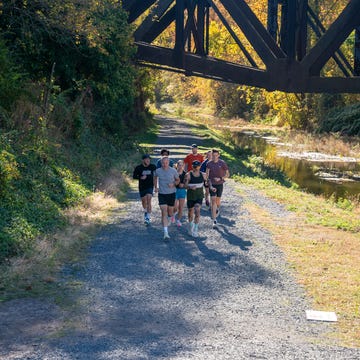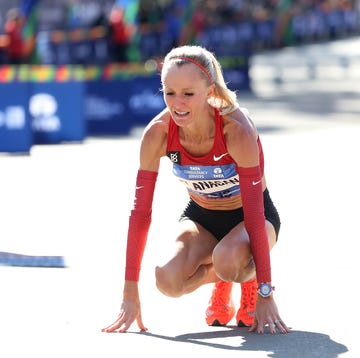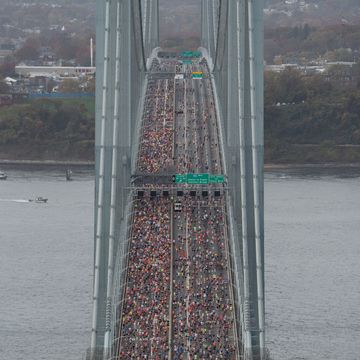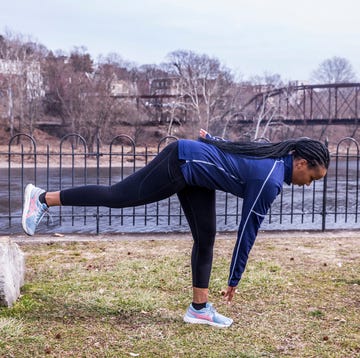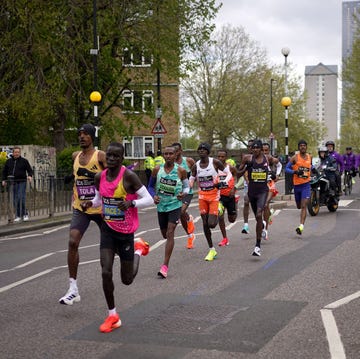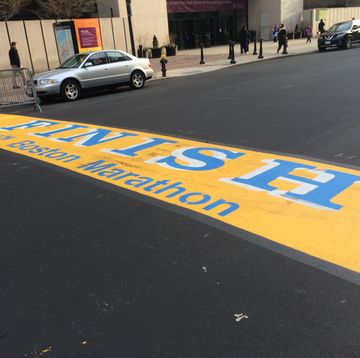Yoshihisa Hosaka, Ed Whitlock and Ed's son, Neil
“Ed-san, please! Please!” says Yoshihisa Hosaka Yoshihisa Hosaka, Ed Whitlock and Eds son, Neil Ed Whitlock’s bag of gear and pulls it away to carry it to the invited athletes’ room. “No, no, that’s quite all right,” a flustered Whitlock replies, futilely trying to keep hold of the shoulder strap. “No, Ed-san! Please!” insists Hosaka before Whitlock resignedly gives in. Respect for one’s elders is a given in Japan, even when you yourself are an elder worthy of respect.
Canada’s Whitlock, age 82, is the oldest man ever to go sub-3 in the marathon, with a 2:58:40 at age 74, while Japan’s Hosaka, 64, ran 2:38:12 at age 61 to become the oldest man to run under 2:40. The pair has been redefining masters running, setting 15 marathon single-age records between them.
With Whitlock lining up to chase his 11th marathon record, the Oct. 20 Scotiabank Toronto Waterfront Marathon saw a little piece of history as the pair of greats met for the first time. Hosaka traveled to Toronto on an invitation from race director Alan Brookes to tackle the age 64 record of 2:42:44. The two record-holders sit down before the race to get to know each other and to talk about longevity, motivation and how to adapt to the changes age brings.
Just four years away from Whitlock’s youngest record (set at 68 years old), Hosaka is thrilled at the opportunity to meet the man, saying, “Once I started setting age records, Ed’s marks have always been there in front of me as a goal. He has set so many that he is a tremendous inspiration and motivation to me. Having the chance to meet him is one of the greatest moments of my life. I feel like I’m standing next to the CN Tower, looking at this towering figure from the base up.”
Opposite, But Similar
At first glance the pair seem like opposites, the long-haired Whitlock modest, dignified and economical in his words and the buzz-cut Hosaka, a former masters surfing champion, overflowing with rapid-fire enthusiasm. To be sure, there are opposing aspects to what they do.
Whitlock’s training consists of very long, very slow runs around a cemetery. See more at "Everything You Need to Know About Hip Pain".
“It was out of necessity,” Whitlock says of this training. “As I got older I found that I couldn’t do interval training any more, so the only solution was to go longer and slower.”
Hosaka, in contrast, lives on a high-volume diet of daily interval training on the hilly roads around his home, and he lifts weights regularly. See more at "SINGLE-AGE WORLD RECORDS".
Whitlock says he typically runs one marathon a year, three at the most; Hosaka does five in a normal year.
But there are intriguing parallels. Both came to marathoning relatively late and still view themselves as primarily shorter-distance runners. And both developed their own idiosyncratic training which, while heading in opposite directions, places an emphasis on doing the same workouts every day.
“I believe I am better as a track runner than as a marathoner, particularly over 5,000 meters and 10,000 meters,” says Whitlock. “I ran my first marathon in my early 40s when my son was going to do his first one, running together in 3:09. My best of 2:31 came when I was 48.” Despite his high volume of marathons, Hosaka says, “I’m better over shorter distances, too. I run a lot of shorter road races and have always done well. When I was 40 I won a local road race and received a trip to run the Honolulu Marathon. I didn’t really know anything about training for it but did 2:31.” At age 45 he improved his best to 2:25:28.
Both went through a lull in marathoning during their 50s. “I believe I ran only one marathon,” recalls Whitlock. “In my case,” says Hosaka, “I kept doing marathons, but my times started to get slower as I got into my 50s.”
It took Hosaka years to refine his training to deal with the aging process, and his first record didn’t come until a month before his 60th birthday, when he ran 2:34:23 at the 2008 Fukuoka International Marathon, the oldest man to ever run Japan’s most celebrated marathon. Two months later he ran 2:36:30 at the 2009 Beppu-Oita Mainichi Marathon, the fastest time ever run by a man 60 or older. “After that,” he says, “I started focusing on setting records and thinking about what it would take to be able to break some of Ed’s.”
Whitlock’s first record took more time, not arriving until age 68 when he ran 2:51:02 at the 1999 Columbus Marathon. “Once I ran that time, I found that nobody 70 or older had run under 3 hours,” he says, “so I set that as my goal. It took me a few tries, but I eventually did it when I was 72.” His longevity since then, 10 single-age records leading into Toronto this year, has been superb, but he downplays any connection to the 10-year break in his 50s. “I’ve never subscribed to the idea that extended rest improves performance or saves you for later,” he says.
“For me,” says Hosaka, “setting records is a hurdle I try to clear. I know that yours will be especially tough to get over, Ed, and since you have set so many I wonder what your mental approach is in targeting a new record.”
“Well,” replies Whitlock, “unlike people such as you who are facing quite tough records and have to think in terms of a few seconds or 1 minute, I have the comparative luxury of having a margin of 30 minutes when I try to set a new record, so it’s not much of a hurdle.” He adds, with a smile, “I know that things won’t be so easy for those who come after me. I’m not the sort of person to say, ‘Rah-rah-rah! You can do it!’ but records are there to be broken, and I hope to see Yoshihisa and others break them. I think the age-73 record, 2:54:49, will be the hardest, but even so it is somewhat surprising that nobody else over 70 has come along and broken 3 hours since I did it. You never know what is going to happen. Clive Davies ran well through his 60s and should have run sub-3 in his 70s but never did.”
Hosaka, up against Davies’ age-64 record in Toronto, nods at Whitlock’s words. “My interval training is getting harder to maintain,” he says, “and I am thinking about how to adjust it to let me continue to set records. I’ve read about Ed’s methodology and have considered applying it to my own training.”
“I am not a coach and do not give advice,” Whitlock replies. “Each person’s body responds to things differently, and this was the way I found to be most suitable. I am not in a position to recommend it to anyone else, as you have to find out what works for yourself. You can try it once and see, but there is no guarantee my approach will work for you.”
Even Legends Need Excuses
Race day in Toronto brings ideal conditions and a slew of records. Ethiopian Deressa Chimsa comes across in 2:07:05, a course and Canadian all-comers record and Lanni Marchant posts 2:28:00 for a Canadian women’s national record.
Hosaka and Whitlock are still on the course in pursuit of the age-64 and age-82 world records. Hosaka is optimistic after running 2:46:17 at July’s Gold Coast Airport Marathon, the all-time second-fastest time by a 64-year-old, in preparation for Toronto, but Whitlock is not. A persistent cold in the week before the race and a fall hurrying to catch a train after appearing with Hosaka at the expo two days beforehand has left him planning to drop out at halfway.
Hosaka started out quick and ran smoothly through much of the first half, but at 25K his legs begin to tighten up, and he runs with difficulty for 10K before he is able to work the issue out. He finishes strong, passing runner after runner over the final kilometers, but comes up short of the record in 2:50:44.
“Only” 2:50:44, for a 64-year-old, but expectations are relative.
Whitlock likewise had a strong start and continued past halfway before getting into trouble after 25K, but while Hosaka was able to turn things around, Whitlock continues to slow. His original goal of a 3:30 is far out of reach, but the record he is chasing is softer. Despite his problems he crosses the line in 3:41:58, taking 7 minutes off the previous age-82 record. “That was quite gruesome,” he says afterward. “When I got to 25 kilometers I knew the last 10 kilometers were going to be a different world.”
Hosaka is waiting at the finish to cheer Whitlock in to the record and to carry his bags. Exchanging stories of their runs over lunch, Whitlock is supportive despite Hosaka’s coming up shy of the record. “It took me several tries to break 3 once I turned 70,” Whitlock says. “But I eventually did it. Keep trying and you’ll have other chances to set records. This time I did it despite having a cold and falling before the race.”
Leaning forward, he says to Hosaka, “I will give you one piece of advice, though.”
“Yes?” Hosaka answers eagerly, eyes wide. With a grin Whitlock says, “You need to make a good list of excuses before the race for the times when you don’t get the record.” Hosaka’s roar of laughter could be heard halfway back home in Japan.
Brett Larner lives in Shibuya, Tokyo, where he edits the Japan Running News website. His long-term running goal is to run the 150th Boston Marathon at age 72 faster than he ran the 100th Boston at age 22.
SINGLE-AGE WORLD RECORDS
Yoshihisa Hosaka
Age 59: 2:34:23 – 2008 Fukuoka International Marathon
Age 60: 2:36:30 – 2009 Beppu-Oita Mainichi Marathon
Age 61: 2:38:12 – 2010 Beppu-Oita Mainichi Marathon
Age 63: 2:46:30 – 2012 Hofu Yomiuri Marathon
Ed Whitlock
Age 68: 2:51:02 – 1999 Columbus Marathon
Age 69: 2:52:50 – 2000 Columbus Marathon
Age 70: 3:00:23 – 2001 London (Ontario) Marathon
Age 72: 2:59:10 – 2003 Toronto Waterfront Marathon
Age 73: 2:54:49 – 2004 Toronto Waterfront Marathon
Age 74: 2:58:40 – 2005 Rotterdam Marathon
Age 75: 3:08:35 – 2006 Toronto Waterfront Marathon
Age 76: 3:04:54 – 2007 Rotterdam Marathon
Age 80: 3:15:54 – 2011 Toronto Waterfront Marathon
Age 81: 3:30:29 – 2012 Toronto Waterfront Marathon
Age 82: 3:41:58 – 2013 Toronto Waterfront Marathon




